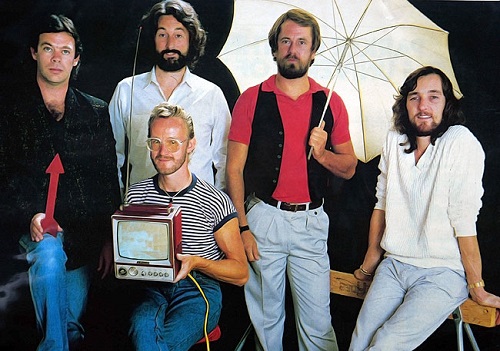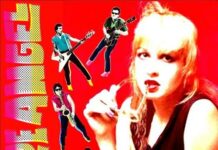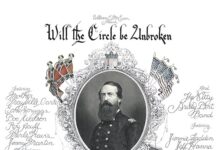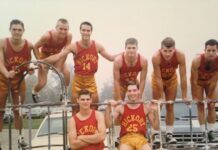Band Photos Courtesy of John Helliwell
Regardless of its commercial stature, Supertramp is one those unique rock bands that never seemed to get a break – enduring its fair share of unfair pot shots over several decades. Their lyrics, sound, look – all of it has seemingly been up for grabs at one time or another.
Yet we can’t forget a moment in time – 1979 to 1980 to be exact — when Roger Hodgson, Rick Davies, Dougie Thomson, John Helliwell, and Bob Siebenberg dominated the American airwaves. The group’s sixth studio album Breakfast In America was THE album on turntables at that time, spitting out four hit singles, drumming up multiple Grammy nominations, and adding the group to entertainment’s eternal lexicon (with forthcoming references on The Simpsons, The Office, and the film High Fidelity to boot).
A pre-fame Katy Perry would also inadvertently introduce the band to a new audience. She serves as the love interest in Gym Class Heroes’ 2005 track “Cupid’s Chokehold,” which heavily samples Breakfast’s own title track, sans its reference to “kippers.” Unfortunately, no other Supertramp album would come close to replicating this kind of multi-million-selling success stateside.
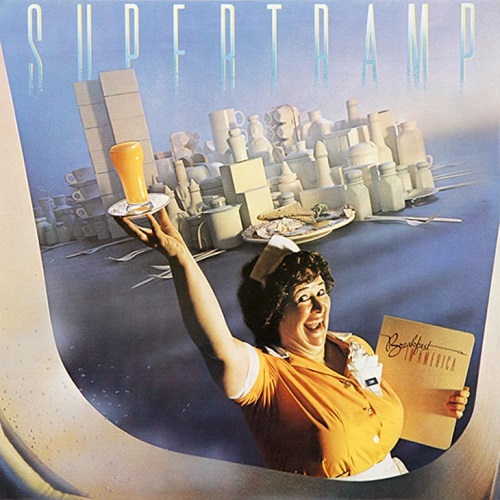
“We knew that we had a great album with Breakfast In America. We had worked hard on it,” Helliwell, the band’s saxophonist and woodwindist, told me recently. “We were almost overwhelmed by the phenomenal success – it seemed that all the pieces of the rock and roll jigsaw puzzle had fallen into place!”
Supertramp’s fame up until 40 years ago resembled a slow-burning flame, beginning with 1974’s loose concept Crime Of The Century album through 1977’s Even In The Quietest Moments…. Noted tracks like “Dreamer,” “Bloody Well Right,” and “Give a Little Bit” gave the band momentum as it built up its worldwide fanbase. With Breakfast, the group turned more introspective as co-vocalists and lyricists Hodgson and Davies offered poignant tracks from the existential (“The Logical Song”) to the wistful (“Take the Long Way Home”).
The tactic worked as Supertramp hit Number One in America for six weeks, ascending the same heights Pink Floyd (The Wall), the Eagles (The Long Run), and Led Zeppelin (In Through The Out Door) did with their own massively successful albums released in ‘79.
“I guess we were surprised. You never know. We knew we had been up and coming over the last few years, so we understood the game,” drummer Siebenberg recalled via email. “We felt we had made a good record and now it was time to go promote. We started touring the album before it came out, so we just hit the road on schedule. Along the way we noticed that lots more people were coming to the shows. And then our venues got changed to bigger places. And then we started playing two nights in the bigger places. After the album came out it just kept building. A&M records were great with us. They promoted the shit out of the album and gave us every chance. We lived up to expectations. It was a blast.”
Of course, with every hit album, the pressure mounts for a followup. Supertramp was no exception. Seeking a way to buy time, the band would release the double live album Paris in 1980, featuring a Billboard Top 15 live version of their 1974 track “Dreamer.”
“After the success of (Breakfast In America) and the previous six years of recording and touring, we needed a rest. The record company … would have liked a follow-up studio album but releasing the live recording Paris gave us that rest and space,” Helliwell said. “We could then start working on our next studio album.”
“We recorded at several locations and the Paris sessions proved to the be the best in terms of performance and audience,” he added. “Most of the chosen tracks from three or four nights there were from just one night. There was a special rapport with that particular crowd.”
“There’s always some pressure from the label and there’s the pressure you put on yourselves. We were very fortunate to have great management who had a great relationship with the label,” Siebenberg adds. “Our two writers, I’m sure, felt the most pressure. We needed to take a break after the tour just to collect ourselves and get back to families and real life for some rest and normalness and figure out what the hell just happened. We were really in the eye of the storm there for a while. Personally, I couldn’t wait to get back out there. I’d spent my whole life up to then playing all the time.”
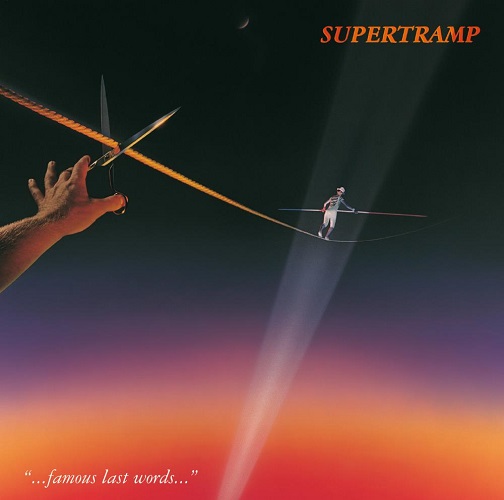
For the group as a collective, the question became how they would follow up one of the biggest albums of the 1970s. The answer lies in 1982’s ironically titled …Famous Last Words…, an album with some definite standout tracks but also leaking band tensions, frustrations, and insecurities throughout. The album cover depicting a person walking a tightrope as it’s about to be cut from underneath them shouldn’t be overlooked either as a subliminal message surrounding what’s to come for the band.
Even with all these elements, it’s one of the band’s best works.
Ironically, Supertramp would record the album in the same region their previous one extolled (California to be exact). Where Breakfast saw four songs hit the charts, Famous produced only two hits – the Number 11 enlightened sax, melodica, and children’s rhyme-fueled ditty “It’s Raining Again,” and the Top 40 ode to doo-wop, disciple of 10cc’s “Donna,” “My Kind of Lady.”
“Success has a way of fucking things up sometimes. The internal low-grade fever of problems sort of burst into a full-blown illness that spelled the death of this version of the band,” Siebenberg said. “Rick and Roger and their personal kitchen tables couldn’t keep it together. We had new songs and old songs ready to go but in the aftermath of the split, Roger started withdrawing his frontline tunes which made Rick do the same. There was very little conflict during the recordings that were done AFTER the split. As a matter of pride, we all managed to hold it together to get through the album and the tour and then Roger and Rick and the rest of us went our separate ways.”
Looking back more than 35 years later, band members have different reactions to the album as a whole.
“In hindsight, I view …Famous Last Words… as an album of songs like Crisis? What Crisis? without a particular overall theme,” Helliwell said. “We did not expect …Famous Last Words… to sell anything like as many copies as Breakfast In America because of the extraordinary massive success of the latter. So we were not surprised by lesser sales.”
“I have two [song] favorites. I love ‘Bonnie.’ It has real power in its performance right at the backing track. And I think ‘Know Who You Are’ is Roger’s best song ever. I think it’s beautiful,” Siebenberg said.
Famous is noticeably different from Breakfast in specific ways. While “It’s Raining Again” recalls the Supertramp of yore, other tracks like “Crazy,” “Bonnie,” “Waiting So Long,” and “Don’t Leave Me Now” have a clear edge to them, essentially giving the band more balls. “Bonnie” alone is a biting love song that is equal parts emotional and sinister. It’s hard to listen to “Don’t Leave Me Now” and now think of Pink Floyd’s own track of the same name.
It also doesn’t hurt that Heart’s Wilson sisters would appear on two tracks, “C’est Le Bon” and “Put on Your Old Brown Shoes” — a worthy companion to The Who’s “Join Together.”
Famous would hit the Top Five in America and prompt the band’s most successful tour to date. Unfortunately, co-lead vocalist Hodgson would depart soon after, leaving the group to carry on without him. He hasn’t been back in the lineup since.
“America is a fickle place. It’s such a huge marketplace and unless you pound it to death with live performance and have the single or singles to capture the airwaves, you get beat out. But to be fair, Breakfast was such a phenomenal success and seller, there aren’t many albums that can compete,” Siebenberg said. “The music business was really changing in 1983. So, you keep your eye on the ball and try to do good work.”
Hopes still hold out for a reunion of the classic quintet. Until that occurs, consider Famous to be a high note of the band’s output, one that may not reach the heights of Breakfast but is just as capable of leaving fans hungry for more.
“I think it fits right in there with our body of work … It got diluted because of the struggles, but [it’s] still a good showing,” Siebenberg says. “You can tell right away it’s us. There are songs and performances on it that are as good as anything we have done.”
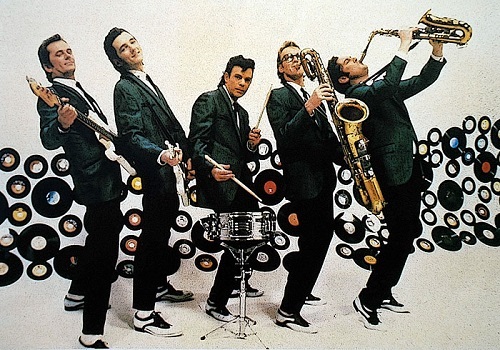
***
Share your feedback and suggestions for future columns with Ira at vinylconfessions84@gmail.com.


